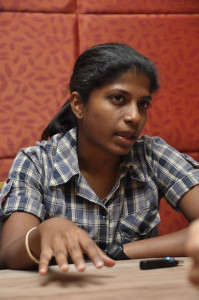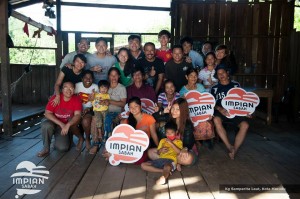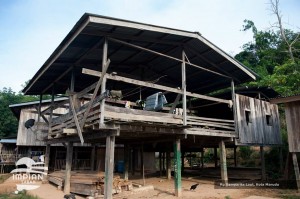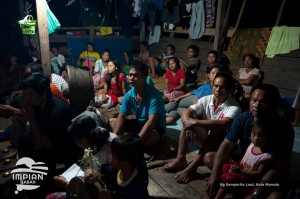The Impian Sabah program was launched last November, with the aim to build a gravity water system that will provide harvested rain water for a village deep in . For weeks volunteers from across Malaysia slogged out at Kampung Samparita Laut in the interior of Sabah to complete a basic infrastucture. The Rocket managed to speak to one of the volunteers, Cynthia Alexander to hear about her experience of serving in the project. Report by T.K Tan. Photos courtesy of Impian Sabah.
Name – Cynthia Alexander
Age -25
Occupation – Marketing Executive
From – Kuala Lumpur
After joining Impian Sabah, what is your feeling about the program?
I had been to Sabah before, doing community work for three months. What was different about Impian Sabah (IS) for me was that it was more meaningful as I was able to help in providing something tangible such as the water supply for the people which everyone should have the right to, which they never had before.
It was a two-way helping; we were really humbled by how they are, how they accepted us and gave us everything they had. They tried to make it so hospitable for us. They gave us their mattress, blankets and everything that they had with no questions asked and no clue as to who we were. They are very selfless and a different type of community.
They did however take a bit of time to warm up to us as we (the volunteers) and them had reservations about each other, though. But once the reservation was out, we became almost like family members. They would ask us to try everything they cook, and they would put sardines, which is a luxury for them on every dish they cook.
We both benefitted from the program. I think I benefitted more from them than they did.
Do you believe that by your volunteering work, it has made an impact for the villagers?
I think it’s a rippling effect. As a volunteer, once I got myself into helping the villagers it seems that I was bitten by a bug. I was possessed by the thought to want to constantly help the people.
I found myself asking, ‘we can’t stop at Kg Samparita Laut only, not just with helping them with the water, what about the other villages in Sabah?’ I now find myself being more conscious about such volunteer work. Its because we have lived in their condition and being exposed to the things that they go through. I think that’s on the volunteer point of view.
When we come back, I think it doesn’t end there. It doesn’t just end with the thought ‘I have put in my one week, that’s enough.’ I was constantly occupied by the thoughts of what can I help out with, what can I do next. I believed that as a volunteer myself, Kg Samparita Laut and IS is just a start to many more volunteer works ahead.
Do you feel aggrieved by what you saw in Kg Samparita Laut, the condition of living and poverty?
In a way I actually felt we were all somewhat responsible for their condition. How could we who are well off and who live in the cities be so oblivious to their plight?
All we seem to be bothered with is our traffic and our other inconveniences. There are people in Malaysia who are still suffering from crushing poverty and living in squalid conditions. We are so privileged and we don’t realised we can do so much more to help them. Just a twenty ringgit will go a long way for them.
During the volunteers’ sharing sessions, what did you sensed from the response of the villagers?
I think it’s difficult for them to change even though they may want the change. They have been under this government for so long and have been mistreated but for them to make a political change even if they knew there are other political alternatives, it is stepping into the unknown for them.
When we spoke to the villagers, we were informed there is not even a branch of opposition parties in that surrounding area. If they want to change, the support system is not there for them make the change. For them, is like dropping into a black hole.
I think programs such as IS will reduce the anxiety for them about change. For them it means something is being done to help their livelihood and plight. But we wouldn’t know for sure; during elections they will be given some cash and vote a certain parties. They are very poor; that cash is very attractive. They may be tempted to go back to the familiar.
What was some interesting thing you took away from the volunteering work?
I thought I would miss my social cycle a lot while I was away. Our coordinator told us that we were thinking too much; when we leave our IPhones, IPads or social media for the duration of the project, no one will miss us. When we came back from Sabah, true enough no one left any messages or show they miss me (laughs)!
Being connected to friends on social media is a norm, but not a necessity. Yet people from Kg Samparita Laut who added me on the Facebook are constantly in contact with me. The people whom we have made an impact in their lives actually appreciated us more.
When you shared about your volunteering experience, did it make it a difference to those who heard or read about it?
Once I got back to Peninsular Malaysia in conversations with my friends, it was constantly peppered with reference to the volunteering work in Kg Samparita Laut and Sabah. I think my friends got sick of me talking about IS; that’s why I had to be in the loop with the other volunteers who came back and continue talking about it (laughs)!
I persisted in sharing about IS and Kg Samparita Laut anyway. The funny thing was, the more I talked about it the more some of my acquaintances show interest about it. I just recently showed the IS video to my colleagues and bosses. Then they encouraged me share it on Facebook, and saying they would share it as well.
If this IS programs is continuous we can continue to share with our friends on the internet and print media. The hype is there; the news about shouldn’t die down. It has to be continuous







